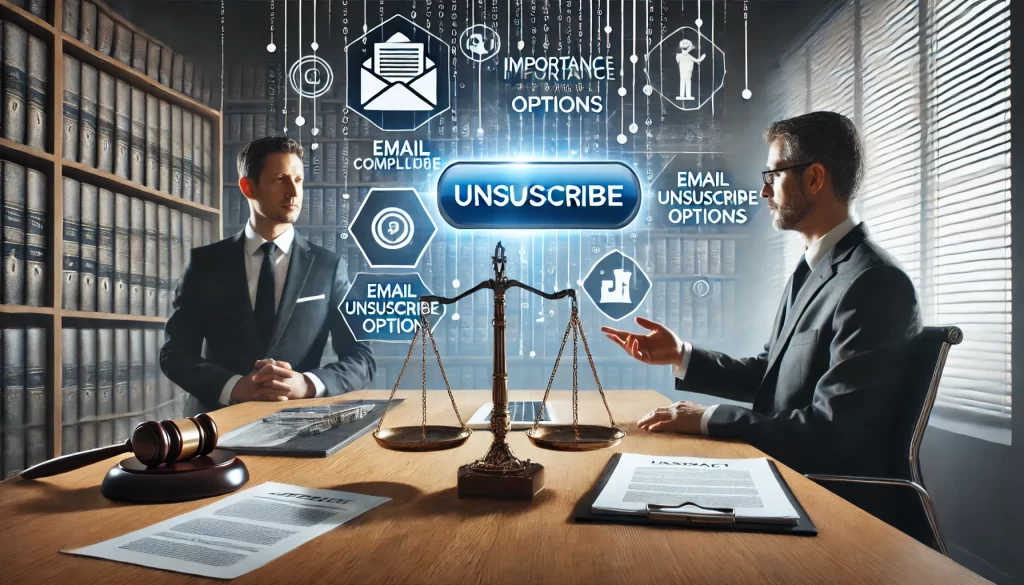What is the Email Unsubscribe Law?
In the digital age, email marketing has become an essential tool for businesses, including law firms, to connect with clients, prospects, and other stakeholders. However, with the power to reach thousands of people in seconds comes the responsibility to follow certain legal guidelines. One such guideline is the Email Unsubscribe Law, which mandates that businesses provide recipients with a clear, easy-to-use way to opt out of marketing emails.
The Email Unsubscribe Law is primarily associated with two key pieces of legislation—the CAN-SPAM Act in the United States and GDPR (General Data Protection Regulation) in Europe. Both laws are designed to give consumers control over the emails they receive and prevent spam, thereby improving the ethical standards of email marketing.
At the heart of these laws is the requirement for businesses, including law firms, to provide recipients with a clear and simple option to unsubscribe from future emails. Failure to comply with this law could lead to severe penalties, damaging the firm’s reputation and resulting in legal consequences.

What the Email Unsubscribe Law Requires
The basic requirements of the Email Unsubscribe Law are simple:
- Easy opt-out: Every marketing email must include a clear and easy-to-use option for the recipient to unsubscribe or opt out of future communications.
- Timely processing of unsubscribe requests: Once a recipient opts out, the business must honor this request and stop sending marketing emails. Under the CAN-SPAM Act, the firm must process these requests within 10 business days.
- Accurate contact information: The email must contain valid contact information, including a physical postal address, which ensures transparency in the firm’s communication.
In short, the Email Unsubscribe Law ensures that businesses, including law firms, do not bombard consumers with unwanted emails, and that they respect individuals’ rights to control the types of emails they receive.
Related Posts
Why It Matters for Law Firms
For law firms, adherence to the Email Unsubscribe Law is not just a matter of best practice but a legal necessity. Failing to comply can lead to significant consequences, both legal and reputational.
Legal Ramifications of Non-Compliance
The CAN-SPAM Act, enforced in the U.S., imposes fines for each violation. This means that if a law firm fails to provide an opt-out option or continues sending emails to recipients who have unsubscribed, the firm could face penalties of up to $43,280 per violation. These fines can quickly accumulate, especially for law firms that send frequent marketing emails.
Additionally, for firms that target or interact with clients in the European Union, GDPR takes a much more stringent approach. While GDPR does not set specific penalties for failing to include unsubscribe links, non-compliance with GDPR’s broader data protection rules can result in fines up to €20 million or 4% of global turnover, whichever is higher.
These penalties can have a significant financial impact on a law firm. More importantly, failing to provide a way for clients and prospects to unsubscribe from unwanted emails could harm the firm’s reputation, leading to a loss of trust and credibility.
Building Trust Through Compliance
In the competitive legal landscape, trust is everything. By adhering to Email Unsubscribe Laws, law firms show clients that they respect their preferences and are committed to ethical, transparent communication. Clients are more likely to engage with a law firm that provides them with control over the communications they receive. In addition to avoiding legal penalties, compliance with the Email Unsubscribe Law can help a law firm build a reputation for professionalism, transparency, and respect for client autonomy.

Best Practices for Managing Email Unsubscribes
To comply with the Email Unsubscribe Law, law firms should implement a series of best practices when managing email unsubscribes. These practices not only help ensure compliance but also improve the effectiveness of email marketing campaigns.
Make Unsubscribe Options Easily Accessible
The most important aspect of managing unsubscribes is making the option easily accessible to recipients. Law firms should:
- Place the unsubscribe link in a prominent location at the bottom of the email.
- Ensure the unsubscribe link is easy to find and not buried in fine print or hidden within other text.
- Use clear language such as “Unsubscribe from emails” or “Opt-out of future emails” to make the action unambiguous.
Process Unsubscribe Requests Quickly
Under the CAN-SPAM Act, businesses must process unsubscribe requests within 10 business days. However, it’s good practice to do so immediately. This ensures that the firm is no longer sending unwanted emails, and it minimizes the risk of violating the law. Failure to process unsubscribe requests quickly can result in legal consequences and damage to client relationships.
Keep Unsubscribe Lists Up-to-Date
Maintaining an accurate and up-to-date unsubscribe list is essential. Law firms should:
- Regularly update email marketing lists to ensure that recipients who have unsubscribed do not receive future emails.
- Use email management software that automatically removes unsubscribed contacts from the email distribution list.
- Regularly review unsubscribe data to identify trends and improve email targeting.
Use Double Opt-In for Consent
To enhance the process of gaining consent, law firms can use double opt-in procedures. This means that once a recipient subscribes to receive marketing emails, they receive a confirmation email where they must confirm their subscription before being added to the list.
This practice ensures that only recipients who genuinely want to receive marketing communications are added to the email list, reducing the number of unsubscribes and minimizing the risk of complaints.
Honor Unsubscribe Requests for All Forms of Communication
In addition to email communications, if a recipient unsubscribes from email marketing, they should not be contacted via other channels, such as phone calls or text messages. Law firms should respect the unsubscribe preferences across all marketing platforms to avoid frustrating clients.
Related Posts
Educate Your Team About Compliance
To ensure compliance with the Email Unsubscribe Law, law firms should train their marketing and administrative teams. By educating your team about the requirements of the CAN-SPAM Act and GDPR, you can avoid costly mistakes and maintain high ethical standards in your communications.
Ensure Your Law Firm’s Emails Comply with the Unsubscribe Law
If you’re unsure whether your law firm is fully compliant with the Email Unsubscribe Law, it’s time to take action. Contact us today to learn how we can help you establish an email marketing system that complies with CAN-SPAM and GDPR, ensuring you avoid penalties while building stronger relationships with your clients.
FAQs
What is the Email Unsubscribe Law?
The Email Unsubscribe Law requires businesses, including law firms, to provide recipients with a clear and easy way to unsubscribe from marketing emails. The law is enforced through regulations like the CAN-SPAM Act in the U.S. and GDPR in Europe.
How long does it take to process an unsubscribe request under the CAN-SPAM Act?
The CAN-SPAM Act mandates that businesses must honor unsubscribe requests within 10 business days. However, best practices suggest processing these requests immediately to maintain good client relations.
What are the penalties for violating the Email Unsubscribe Law?
Violating the CAN-SPAM Act can result in fines of up to $43,280 per violation. For law firms targeting clients in the EU, non-compliance with GDPR could lead to fines of €20 million or 4% of global turnover, whichever is higher.
Can law firms send marketing emails without an unsubscribe option?
No. Under both CAN-SPAM and GDPR, law firms must provide an unsubscribe option in all marketing emails. Failing to do so could lead to legal consequences and damage the firm’s reputation.
How can law firms manage unsubscribes effectively?
Law firms can manage unsubscribes by making the option easy to find in every email, processing requests promptly, and keeping their email lists up-to-date. Implementing double opt-in procedures and educating staff about compliance are also key best practices.
Key Takeaways
The Email Unsubscribe Law is an essential regulation that law firms must follow to maintain compliance with email marketing standards. By understanding the requirements of the CAN-SPAM Act and GDPR, law firms can avoid legal penalties, enhance client trust, and improve the effectiveness of their email marketing campaigns. Ensuring that unsubscribe requests are handled swiftly and that opt-out options are available is crucial for any law firm’s success in email marketing.
- Law firms must comply with the Email Unsubscribe Law, which mandates clear unsubscribe options in marketing emails.
- Non-compliance with CAN-SPAM and GDPR can result in hefty fines and reputational damage.
- Law firms should implement best practices, including easy unsubscribe options and timely processing of requests, to stay compliant and build trust.
